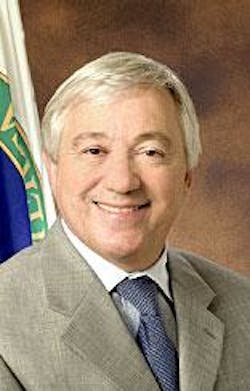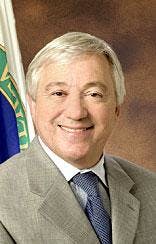Point of View: EIA's Caruso: DOE's information unit to bolster data quality, international scope
Created in the wake of the oil price spikes of the 1970s, the US Energy Information Administration continues to strive to be relevant to industry, investors, and the general public seeking reliable and unbiased energy information.
EIA is the independent statistical arm of the US Department of Energy. Government and industry officials rely heavily on EIA, and especially its web site, to provide timely, accurate, and policy-neutral data.
This July the Senate approved the White House's nomination of veteran energy policy analyst Guy F. Caruso to be the agency's new administrator. President George W. Bush's pick to run the agency was widely lauded by energy experts regardless of political affiliation; Caruso has 36 years experience analyzing an international energy industry that is driven by geopolitics as often as by market fundamentals. And that international experience may help make EIA even more relevant as the US ponders expanded military action in oil-rich Iraq.
International focus
Strengthening the agency's international focus is an important reason why Caruso wanted to return to government service, he said in a recent interview shortly after he assumed his post.
"It is a reason why the job attracted me; my background is in the international security side, and that's particularly useful during times of conflict," he said.
Acknowledging the administration's interest in Iraq, Caruso said that updating his agency's database on the Middle East and the Persian Gulf has been a top priority of late.
"When something happens we shift resources; there is a linkage of priorities so policy-makers have as much up-to-date information as they need."
EIA, however, remains committed to remaining policy-neutral, he said. He told the Senate energy committee on May 8 that he fully supports EIA's independence. "The trust and credibility of EIA information is essential to the fulfillment of that mission," Caruso said then. And since his confirmation by the Senate, he reiterated that view, saying in an interview with OGJ that it is "essential to our credibility" to be viewed as an independent information provider on key energy data. EIA issues data on oil and gas supply and demand, import statistics, inventory levels, and a wide range of information on fossil and renewable fuel use trends in the US and abroad.
Goals and mission
At his confirmation hearing last spring, Caruso told the Senate Energy Committee there are three areas that deserve particular attention at the agency: improved data quality, communicating the analytical underpinnings of assumptions EIA economists make when conducting various analyses, and increasing public understanding through education.
"During this critical time of changing circumstances in the US energy industry, there is a renewed emphasis on energy security, and continuing the need for increased transparency of energy information, which is a major role of EIA, is more important than ever," he said.
Prior to his EIA appointment Caruso was the executive director of the Center for Strategic and International Studies in Washington, DC. And before CSIS, Caruso spent 32 years as a career US government employee, working in a number of senior management positions closely associated with energy markets, energy security, and energy policy. These included stints at the Central Intelligence Agency and the Department of Energy in Washington, and the International Energy Agency in Paris.
Short-term challenges
In the short term, Caruso said the agency is focused on getting its winter fuels report and analysis prepared for release in early October.
But he acknowledged that continued uncertainty about the Middle East will be a key factor for analysts to consider as they prepare their reports. Along with the winter fuels outlook, EIA has a number of benchmark publications that give energy supply-demand projections for both the short and long term. Experts within and outside government often cite the agency numbers in their own reports. "There are always going to be conflicts over public policy, but for us it is essential for our credibility to keep independent," he said.
Another immediate challenge for the agency is its expanded role providing natural gas market information on a weekly, instead of monthly, basis. EIA this spring assumed the role that the private American Gas Association carried for several years but discontinued earlier this year.
The Natural Gas Supply Association recently said it remains supportive of the agency as it seeks to retool new weekly storage reports. But some individual companies have said that EIA's storage numbers are still too unreliable. Some gas marketers, for example, say that unscrupulous market players could misreport a significant volume, take a corresponding position in the market to gain a profit, and then issue revised numbers later without penalty. The agency solicited public comment on how to improve the accuracy of its mandatory reports, which EIA previously furnished monthly when AGA was still conducting its own voluntary weekly survey among market participants.
Caruso acknowledged those market concerns and said the agency is working hard to address the issue.
"EIA has made and will continue to make efforts to create more accurate data," he said. "We are moving in the right direction. We are asking for comments and working with comments, and we expect to improve as time goes on."
Nevertheless, he noted that volatility is to be expected in the weekly gas storage report, because it "is inherent in any short-term weekly collection system." He noted that "petroleum data (are) also often volatile, and (they get) revised as well."
Improving data quality for all energy statistics is an important goal for the agency, he said. To that end, Caruso also plans to step up efforts to improve the accuracy of international oil inventory numbers.
He said that EIA supports the ongoing United Nations-IEA effort to improve oil data quality. But at the same time, there is room for improvement, he said.
"Obviously some countries find some numbers sensitive; for example, production numbers from OPEC (Organization of Petroleum Exporting Countries) can be difficult, as can consumption numbers from non-OECD (Organization for Economic and Cooperative Development) countries," he said.
Still, there is plenty of room for optimism, he stressed.
"A lot of work can be done below the politically sensitive levels," he said.
He also expressed hope that the recent summit between producing and consuming nations in Osaka would move that process forward (see Watching Government, this page).
"My question is that can some of these data be institutionalized? There is a lot of room for technical-level coordination," Caruso said.
Career highlights
US Energy Information Administration
In July, the US Senate approved Guy F. Caruso as administrator of the Energy Information Administration, a statistical agency within the US Department of Energy that provides policy-independent data, forecasts, and analyses regarding energy. President George W. Bush nominated Caruso in February; he has acquired over 30 years of energy experience, with particular emphasis on energy markets, policy, and security.
Employment
Caruso first joined DOE as a senior energy economist in the Office of International Affairs and soon became the director of the Office of Market Analysis in 1978. Other leadership roles he held previously at DOE include director, Office of Oil and Natural Gas Policy at the Office of Domestic and International Energy Policy; and director, Office of Energy Emergency Policy Evaluation. Prior to joining DOE, Caruso worked at the Central Intelligence Agency as an international energy economist in the Office of Economic Research.
Caruso worked at the Paris-based International Energy Agency during April 1993-98. He worked first as the head of the Oil Industry Division, where he was responsible for analyzing world oil supply-demand and developments in the oil industry, and later, as director of the Office of Nonmember Countries, where he directed studies of energy-related developments.
He also served as the executive director of the Strategic Energy Initiative Project under the Energy and National Security Program of the Center for Strategic and International Studies (CSIS), during October 1998-August 2002. CSIS is a private, nonpartisan organization dedicated to providing world leaders with strategic insights on, and policy solutions to, current and emerging global issues.
Also before his latest EIA stint, Caruso was the director of the National Energy Strategy project for the United States Energy Association (USEA). During this time, Caruso spearheaded the USEA publication "Toward a National Energy Strategy," released in February 2001, and a follow-up study, "National Energy Strategy Post-9/11," released in July.
Education
Harvard University, JFK School of Government, masters of public administration, 1975 (course emphasis on economics and energy).
University of Connecticut Graduate School, MA, international economics, 1966.
University of Connecticut, BS, business administration, 1964.
Organizations
Charter member, International Association for Energy Economics, 1977 to the present.

